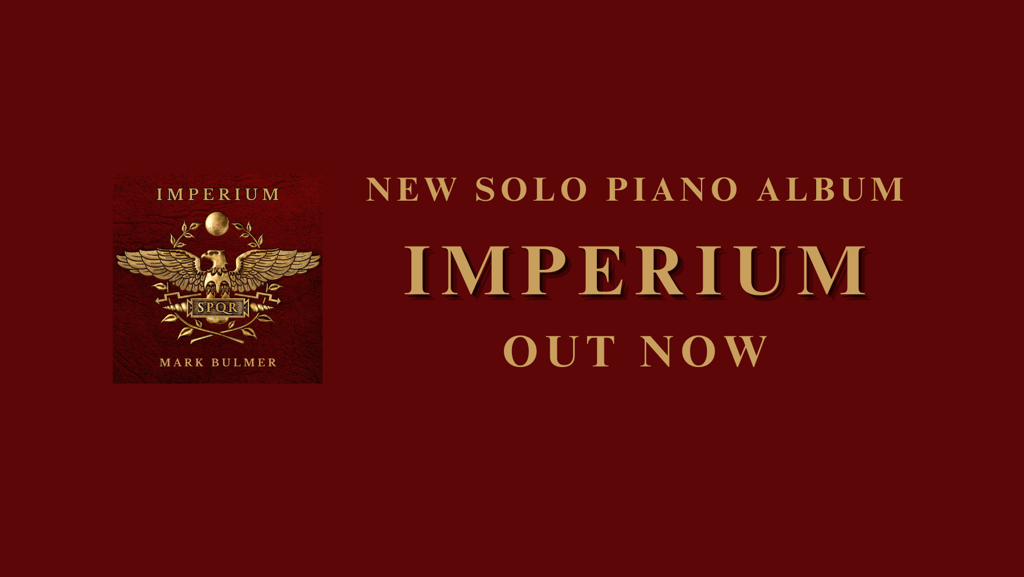IMPERIUM: The Story of Rome in Solo Piano
If Rome had a soundtrack, this would be it. IMPERIUM — new album out now !
3/16/2025


I’m proud to announce the release of my new solo piano album, IMPERIUM... on the Ides of March, no less !
This project has been years in the making, blending my lifelong study of Ancient Rome with my work as a composer. IMPERIUM tells Rome’s story in sound: ten tracks that span from its legendary founding to the dawn of the Empire. Each piece is inspired by a pivotal event or era, drawing on ancient sources while transforming history into music.
This is Rome as I hear it — cinematic, dramatic, and human.
IMPERIUM is out now!
🎧 Buy / Download: https://ffm.to/elv2jq6
🎶 Stream: https://ffm.bio/1p2p81e
🎬 Official Artist YouTube Channel: https://www.youtube.com/@markbulmer
🎥 Available for TV, film, and soundtrack sync licensing
Track List & Historical Inspiration
1. For the Glory of Rome (Listen on YouTube Now: https://youtu.be/9npbXLwKgWM)
History: 753 BCE – Romulus founds Rome after killing Remus, establishing the city on the Palatine Hill (Livy, Ab Urbe Condita 1.6–7).
Tempo/Character: Bold, stately, and triumphant.
Inspiration: Written to sound like a Roman anthem — a proud opening statement for the album, evoking grandeur similar to cinematic scores like Gladiator.
2. Punic Wars
History: 264–146 BCE – Rome’s three wars with Carthage culminate in Carthage’s destruction, cementing Rome’s Mediterranean dominance (Polybius, Histories 1–3).
Tempo/Character: Driving and martial, with shifting dynamics.
Inspiration: Reflects the long, grinding nature of three wars — alternating between moments of relentless momentum and tense, uneasy calm.
3. Ghosts of Cannae
History: 216 BCE – Hannibal annihilates Roman forces at Cannae. Over 50,000 Romans die in one of the Republic’s worst defeats (Livy, Ab Urbe Condita 22.49–51).
Tempo/Character: Slow, haunting, somber, and heavy.
Inspiration: Built like a funeral lament, capturing the immense loss of life and the haunting legacy that followed.
4. Pharsalus
History: 48 BCE – Caesar defeats Pompey in Greece, consolidating power and pushing Rome toward dictatorship (Appian, Civil Wars 2.71–82).
Tempo/Character: Tense, propulsive, and storm-like.
Inspiration: Reflects the chaos of civil war — rapid passages evoke clashing legions, while dramatic pauses mirror the uncertainty of Rome’s fate.
5. The Ides
History: 44 BCE – Julius Caesar is assassinated by senators, including Brutus and Cassius, in the Theatre of Pompey (Plutarch, Caesar 66–67).
Tempo/Character: Unsettled, shifting between calm and violence.
Inspiration: Uses abrupt changes in rhythm and harmony to capture betrayal and the shock of the moment.
6. Philippi
History: 42 BCE – Octavian and Antony defeat Brutus and Cassius in Macedonia, ending the Liberators’ resistance (Appian, Civil Wars 4.105–138).
Tempo/Character: Relentless and dramatic.
Inspiration: Built around a march-like pulse — a grim reflection of the final stand of the Republic’s defenders.
7. Dying Republic
History: 42–31 BCE – The Second Triumvirate fractures as Octavian rises and Antony allies with Cleopatra, eroding the Republic (Dio Cassius, Roman History 49–50).
Tempo/Character: Dark, slow-building, and foreboding.
Inspiration: A piece of decline and disintegration — the music decays into instability, echoing the Republic’s collapse.
8. Actium
History: 31 BCE – Octavian’s fleet defeats Antony and Cleopatra off Actium, securing his sole control of Rome (Plutarch, Antony 65–68).
Tempo/Character: Energetic, wave-like, and dramatic.
Inspiration: Driven by rolling, tidal rhythms that mirror naval battle — sudden bursts of energy reflect the clash at sea.
9. Pax Romana
History: 27 BCE onward – Octavian, now Augustus, establishes the Empire and ushers in two centuries of relative peace (Tacitus, Annals 1.1–2).
Tempo/Character: Calm, spacious, and meditative.
Inspiration: Written to breathe — long phrases and open harmonies symbolize stability after centuries of conflict.
10. SPQR
History: Eternal Rome – “Senatus Populusque Romanus” endures as a symbol of Rome’s power and identity across millennia.
Tempo/Character: Grand, expansive, timeless.
Inspiration: A closing statement that ties the album together, echoing the idea of Rome’s eternal legacy in music.